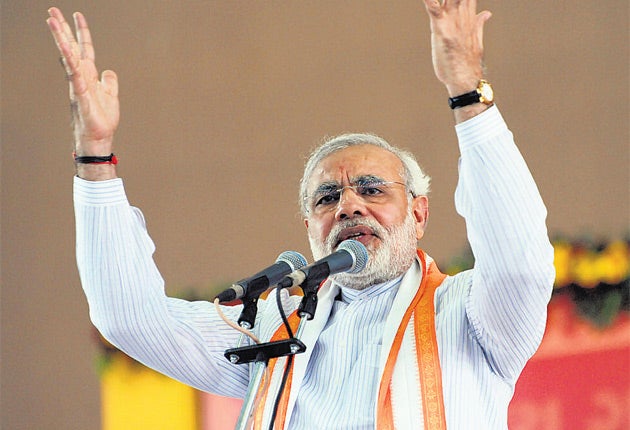A rebirth dogged by controversy
Notebook

In India the idea of rebirth and reincarnation is never far away. And so it was last week when an announcement by the Supreme Court offered a second opportunity for perhaps the country's most controversial politician. Narendra Modi, chief minister of Gujarat and a member of the opposition Bharatiya Janata Party, stands accused of failing to stop (and even of facilitating) the murder of hundreds of Muslims in an orgy of shuddering violence that took place in his state in the spring of 2002.
Locally, Mr Modi, who has always denied the claims, did not let the allegations get in his way. Concentrating on development issues and reaching out to industry and business leaders both from home and abroad, he was twice re-elected to the state's most senior position.
But at a national level, it appeared there was reverberating unease about the man and his hard-line "Hindutva" philosophy. When he was brought out to campaign in the 2009 general election, his impact was lacklustre and his national ambitions appeared dashed.
But last week's announcement by the court may have changed that. The court had been asked to hear allegations concerning the killing of up to 70 people at the Gulbarg Society apartments in Ahmedabad. By sending the case back to a lower, local tribunal and by declining to name Mr Modi, the court deflated much of the potential controversy.
After the court made its announcement, the 61-year-old wrote on Twitter: "God is great."
Mr Modi's supporters in the BJP, struggling to locate and gather around a charismatic leader with national clout, leapt on the ruling, saying their man had been cleared and that any obstacles to him becoming a candidate for prime minister in 2014 had been removed. This weekend, Mr Modi held a "harmony fast" in the company of a flurry of high-profile BJP leaders who rapidly made their way to Gujarat, wanting to be seen to siding with a potential winner.
But the allegations that have dogged him for almost a decade are not going to go away. Last year, I visited the ruins of the Gulbarg Society apartments with one of the survivors, Imtiyaz Pathan, who was accompanied by an armed policeman, appointed by the courts for his safety.
As we made our way around the fire-scorched ruins, Mr Pathan recalled how the Muslim residents were for hours surrounded by a baying mob of Hindus. He said that as the situation worsened, Ehsan Jafri, a former MP, in whose house people had gathered for safety, picked up the phone and called Mr Modi directly and asked him to send help. "After calling Modi, Jafri was totally depressed," said Mr Pathan. "When I asked him what happened, Jafri said, 'There will be no deployment [of police].' In fact, he said that Modi had abused him, that he had used abusive language."
After giving himself up to the gang in an attempt to try and "buy" the safety of the other residents, Mr Jafri was never seen again. It was his family who had sought to have the Supreme Court hear their petition. His widow, Zakia, told reporters this week: "I am totally disappointed."
An indication of the unresolved issues showed itself as rapidly as this weekend. As Mr Modi was being feted by his supporters, survivors of the 2002 violence and other activists sought to hold their own gathering at the site where the chief minister was sitting. Rather than being allowed to gather, up to two dozen of them were reportedly detained by the police. Perhaps that talk of a new beginning is a little too early.
Worth saving up your bullock-cart for a rainy day
The monsoon rain that annually falls across South Asia is both a blessing and a curse. Countless millions depend upon it to irrigate their crops and replenish their wells in an environment that is often barren and dry.
But at the same time, every year there are stories of woe and misery. Southern Pakistan is currently struggling to help more than 5 million people made homeless by huge flooding, while in the eastern Indian state of Orissa, more than 2.2 million people also need immediate help.
Delhi does not suffer as badly as some places. But this week, the capital wrote its own little footnote to this year's monsoon stories when, on Thursday, 117mm of rain – the equivalent of the average for the entire month of September – fell in just three hours.
It was the most rain in the city in a single day since 1959, and such was the downpour that even parts of the new international airport terminal were flooded.
The following day, newspapers showed how, with the roads too flooded for cars to move, bullock-carts were often the only way to get around.
A taxi driver's calm amid the storm
Despite the downpour, a friend managed that same evening to keep our pre-arranged appointment and arrived at my apartment in a taxi, just as the rains eased. A journalist based in the south of India, he is working on a feature about what makes the south so markedly different from the north. Why was it, he asked, people in Delhi were so upright and positively aggressive?
We discussed culture, language, climate, diet, even genetics. In the end we settled for "capital city syndrome", a pushiness and attitude that reveals itself in capitals across the world.
On that day of rains and bullock-carts, it would have been understandable had his taxi driver been fed up that we kept him waiting and also asked him to drop me off on the way home. As it was, he was utterly friendly, a reminder that even in the most stressful conditions some people manage to keep their charm.
a.buncombe@independent.co.uk
Join our commenting forum
Join thought-provoking conversations, follow other Independent readers and see their replies
Comments
Bookmark popover
Removed from bookmarks